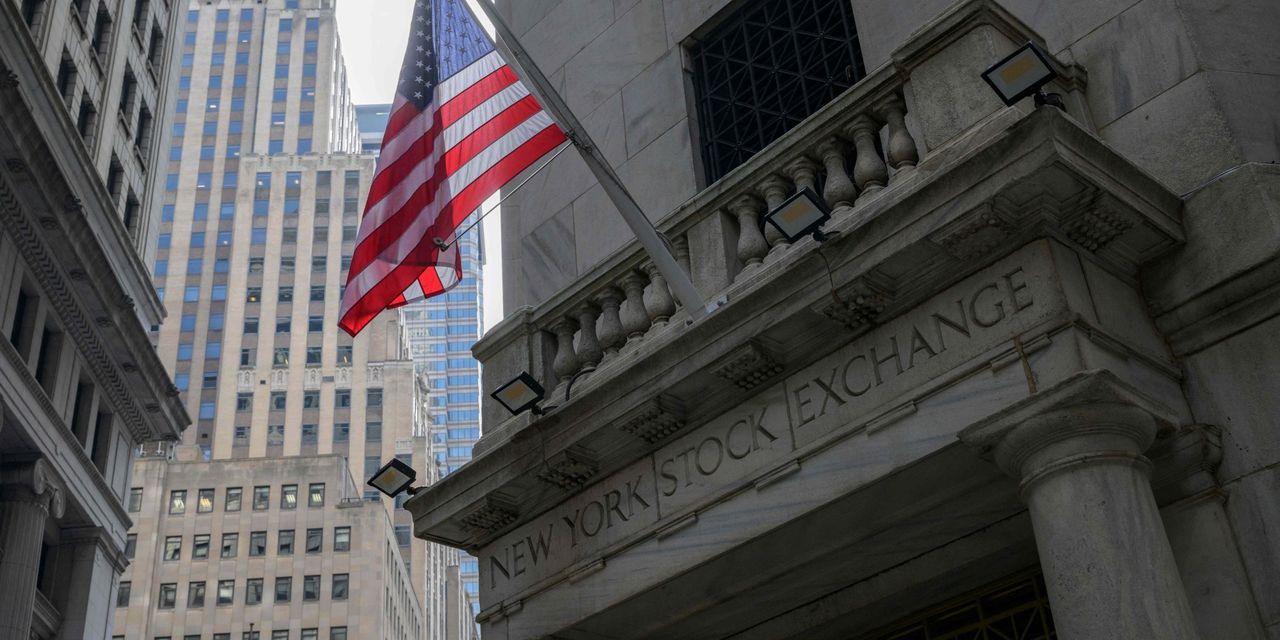U.S. stocks were off to a cautious start on Monday on the heels of a rough week for equities, as the 10-year Treasury yield pushed past the psychologically important level of 5% for the first time since 2007.
Investors are facing a crucial earnings week, with big tech names due to report.
How stocks are trading
-
The Dow Jones Industrial Average
DJIA
fell 190 points, or 0.6%, to 32,938. -
The S&P 500
SPX
was down 29 points, or 0.7%, at 4,195. -
The Nasdaq Composite
COMP
declined 120 points, or 0.9%, to 12,863,
The Dow fell 1.6% last week, while the S&P 500 declined 2.4% and the Nasdaq Composite shed 3.2%. All three major indexes saw their biggest declines since the week ending Sept. 22. The S&P 500 on Friday saw its first close below its 200-day moving average since March.
What’s driving markets
The 10-year Treasury yield
BX:TMUBMUSD10Y
remained up 5.1 basis points near 4.972%, after topping the 5% level and trading at its highest in 16 years. The 10-year yield finished last week with the biggest weekly rise since April.
Read: Stock-market investors face reality of 5% Treasury yields. Here’s what’s next.
“Higher for longer has been hitting home of late, with the back end of the yield curve on the rise in response to shifting expectations around the timing of a Fed rate cut. With energy prices on the rise in the face of a potentially drawn-out conflict in the Middle East, there is a strong chance that we see inflation continue to push higher,” Joshua Mahony, chief market analyst at Scope Markets, said in emailed comments.
“With interest rates expected to remain elevated for some time yet, the U.S. Treasury will also be facing a rapidly inflating debt that questions whether U.S. bonds are truly the reliable haven they have always been perceived to be,” he said.
In One Chart: Why a 5% Treasury yield sends a gloomy stock-market message right now
Investors continue to monitor events around the Israel-Hamas war.
Two U.S. hostages were released Friday and some initial aid got through to Gaza, with signs a ground invasion by Israel has been delayed. Oil prices
CL.1,
BRN00,
were lower.
The data calendar is empty for Monday, but the week will bring updates on the housing market, growth and the Fed’s preferred inflation gauge, the personal-consumption expenditures price index, due Friday.
On the earnings front, an important batch of results is rolling out this week that could determine the course of the remaining third-quarter earnings season, with Microsoft Corp.
MSFT,
and Google parent Alphabet Inc.
GOOGL,
reporting Tuesday, Meta Platforms Inc.
META,
reporting Wednesday and Amazon.com Inc.
AMZN,
on Thursday. Market optimism has wavered following mixed bank earnings.
Read: Big-tech results will decide ‘where we go from here’ amid investor caution. They would fall if it weren’t for this one company.
And then there are the technical factors for investors to fret about, with the S&P 500 closing below the 200-day moving average, seen by many Wall Street chartists as the dividing line between longer-term uptrends and downtrends.
“The index is now just 1% away from falling below the bull boundary around 4,190,” Michael Kramer, found of Mott Capital Management, told clients in a note. He said the next stop for the index could be 4,183.
Companies in focus
-
Chevron Corp.
CVX,
-2.09%
said Monday that it’s reached a deal to buy Hess Corp.
HES,
+0.04%
in an all-stock agreement valued at $53 billion, or $171 per share. Chevron shares fell 2.7% in premarket trade, while Hess shares rose 0.7%. -
Tesla Inc.
TSLA,
+1.05%
is voluntarily recalling nearly 55,500 Model X electric vehicles made in the past two years, as the vehicles’ controllers may fail to detect low brake fluid and not display a warning light. Separately, Tesla said in a 10-Q filing Monday that it expects capital expenditures for this year to exceed $9 billion. Shares fell 4.1%.
Read the full article here






